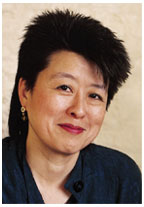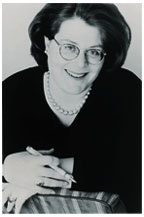|
February 21, 2001: Class Notes Class Notes Features: A voice for social justice: Helen Zia '73 tells the stories that have galvanized Asian Americans Caroline Sharp '83 helps would-be writers sharpen their pencils Email your class notes...many secretaries have email. Check our online Class Secretaries Directory.
A
voice for social justice elen Zia '73 has
become a voice for Americans of Asian descent. A writer and social-justice
activist, she has brought light to issues and stories that profoundly
impact the Asian-American community. Her recent book, Asian American
Dreams: The Emergence of an American People (Farrar, Straus and
Giroux, 2000), chronicles the transformation of Asian Americans
from disparate ethnic groups into a self-identified community with
influence in American society. The daughter of Chinese immigrants,
Zia details pivotal events that galvanized Asian Americans during
the past 20 years such as the 1982 murder of Vincent Chin, a Chinese
American, by two white autoworkers who thought he was Japanese and
the 1992 Los Angeles riots that devastated many Korean-American
shop owners. Named Chinese-American
Journalist of the Year by the Organization of Chinese Americans
in 1998 and one of the most influential Asian Americans of the decade
by A. Magazine in 1999, Zia was inspired to write Asian American
Dreams during the 1996 presidential campaign, "which spotlighted
Asian Americans as the sole cause of [campaign finance] corruption
in the American political system." In 1997, she helped author
a complaint to the Democratic and Republican National Committees
on racially discriminatory treatment of Americans of Asian descent. Zia grew up in a "sheltered
Confucian home" in New Jersey and first became involved in
political causes at Princeton. She protested racism and the Vietnam
War, and became active in the Third World Center and a nascent Asian-American
movement, which, she says, "transformed me. . . . Through it,
I began to find my voice." After graduation and
two years of medical school, she headed to Detroit "to discover
how life was lived in the American heartland" while working
as a large press operator for Chrysler. When the auto industry collapsed,
she began writing on labor issues and "the rise of the new
poor." Then came five years in New York City as executive editor
of Ms., and, in 1992, a move to San Francisco, where she now lives. Zia's next project
is "writing the story of Dr. Wen Ho Lee," the Los Alamos
scientist accused by the U.S. Government of security breaches. "His
side," says Zia, "has never been told." By Caroline Moseley
Caroline Sharp '83 helps would-be writers sharpen their pencils Composing fiction is
hard work. Caroline Sharp '83 would even say that it's downright
painful. "If you feel that you're doing it wrong because it's so
damn difficult, then you are doing it right," says Sharp, the author
of A Writer's Workbook (St. Martin's Press), which provides
daily writing exercises and loads of encouragement for wanna-be
fiction writers. "There's no magic to writing," says Sharp, who
developed the exercises largely for herself. Rusty after a year-long
hiatus spent rearing her two young children, she needed help getting
her writing back in shape. The exercises work on
character, plot, and description. One exercise asks the reader to
hang out in a public place and record dialogue. Another has the
reader develop an "idea book" for recording everyday experiences,
ideas for stories, and notes on books and movies. All life experiences,
she says, "can be brought to bear on your writing." Sharp,
who majored in psychology at Princeton and earned an M.F.A. in film
from Columbia, has taught piano, scooped ice cream, and been a secretary
and a stockbroker. She's been churning out stories on a regular
basis since the age of 10 -- most of which "were completely
awful for the first 15 years," says Sharp, who lives in New
York City. By K. F. G. |
|||||||||


